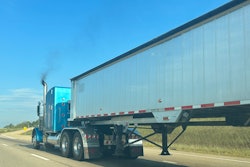The cost of compliance is the top challenge faced by motor carriers with regard to compliance, safety, and administrative-related tasks, according to a survey conducted by Fleetworthy, with 96% of respondents reporting reducing costs in other areas of their business to cover compliance-related expenses over the past 12 months.
The report, surveying 300 U.S.-based employees of large (500+ vehicles) and midsize (50-500 vehicles) trucking companies and owner-operators (single truck operators), found that the increasing costs and administrative tasks required for trucking companies to maintain compliance and run efficiently are major issues impacting operations.
With regulations in our industry constantly changing, Fleetworthy President and Chief Strategy Officer Michael Precia said fleets and owner-operators are spending a lot of time and money ensuring their trucks and company are staying compliant.
"In many cases, keeping up with compliance-related tasks hampers a trucking company's ability to grow its business," he said, adding 95% of all respondents in the report said compliance challenges are holding fleets and owner-operators back from growing their businesses and offering new services.
According to the report, the possibility of a nuclear verdict in the event of a significant accident or legal dispute is a top concern. This is especially the case for midsize and small trucking operations that have more limited resources and capabilities to maintain robust compliance records and safety programs.
More than one-third (35%) of leaders at midsize fleets reported being very or extremely concerned about being involved in a nuclear verdict case, but the upside is that 93% of all fleet leaders surveyed believe their organization has a strong safety culture and is well informed on all DOT regulations. Among owner-operators, 97% thought they were more aware of safety and compliance best practices and DOT regulations compared to other independent truckers on the road.
To assist with fleet and driver safety, the report found an overwhelming majority of all respondents (96%) have made some type of investment in safety equipment in the past 12 months. In addition, in-cab cameras and monitoring systems are among the top (51%) of equipment fleet and owner-operators are adding.
Contents of this video
00:00 10-44 intro
00:28 Fleet technology
01:36 DOT audits
03:29 Streamlining data
04:53 Nuclear verdicts and good recordkeeping
07:05 Managing tolls
09:10 Finding a technology partner
Speaker 1:
CCJs 10 44 is brought to you by Chevron Delo, heavy duty diesel
Speaker 2:
Engine oil. Now there's even more reasons to choose Delo, how fleets can use technology to improve their processes and make their businesses more efficient.
Speaker 1:
You're watching CCJs 10 44, a weekly episode that brings you the latest trucking industry news and updates from the editors of CCJ. Don't forget to subscribe and hit the bell for notifications, so you'll never miss an installment of 10 44. Hey everybody, welcome back. I'm Jason Cannon, and my co-host is Matt Cole. A new report released this month by Fleet Worthy details, the findings of a survey of trucking industry professionals, from fleet managers to owner operators. The survey asked respondents about regulatory compliance and various challenges facing the
Speaker 2:
Industry. The survey showed that many fleets and operators struggle with managing paperwork, which has a trickle down effect on compliance and other areas. Fleet worth's goal with the survey was to provide more information to fleets about where the biggest challenges are and how those can be addressed.
Speaker 3:
So the survey has a short history. It was the first one that we've done, but I think it connects to the mission that we've always had, which is partnering with fleet operators and trying to bring as much data knowledge and guidance to bear so that they can run their operations not only efficiently, but also making sure that they're following the regulatory guidelines and that are out there. So it's the first but of many, and we want to do it in a way that fleets of all sizes can take advantage of another resource to get data and information just to help them run their day-to-day operations.
Speaker 1:
Nearly two thirds of survey respondents said they weren't 100% sure that their fleet could pass a DOT audit.
Speaker 3:
I think there's a few things that caused that concern. One is, if you look at carriers of all sizes, there's kind of this unfair environment, right? If you look at their back offices, a lot of carriers, regardless of side, have manual processes, aging systems, spreadsheets, emails, paper-based information. And in the meanwhile, when you look at the truck and the technology that's being injected into the truck and all the data that's coming out of the truck, it's hard for a carrier to keep up with everything that's coming out that could negatively or positively impact how they do in an audit. So I think that's part of it. They have a lot of despair systems that they're trying to keep track of. So how can you comfortably say if the auditors came in, we pass when you don't really have one place to go to check all the different KPIs and things that are going to lead to them passing an audit. Some of the things that we're trying to do with our technology and services is to change that as much as we can for our customers.
Speaker 2:
Streamlining all of the data a fleet brings in through various sources can help produce the anxiety around DOT audits. Mike explains how after a word from 10 44 sponsor Chevron lubricants,
Speaker 4:
We serve customers from Birmingham, Alabama to the Gulf Coast, so our people and our trucks are booked solid all day. There is no slack in our schedules. These trucks can't break down. I choose an engine oil that takes care of the number one issue with our engines emissions, so we don't have to worry about DPF clogging. I choose the engine oil that keeps our trucks hauling. I choose DELO 600 A DF.
Speaker 3:
We argue that when you look at all the different levers that you have to be monitoring from a compliance perspective, if you can create a solution or leverage a solution that becomes the command center for all that data, a single pane of glass that you go to one place to check how you're doing, not only in driver compliance, but asset compliance. That's a first step. We know that most of these carriers have to focus on top line revenue. How do you mix that with having the bench strength and the people to really help build that moat around your carrier, your authority from a compliance perspective? So we talk about a three-legged stool. It's like, and if you can find a vendor that has bench strength of subject matter experts that can become an extension of your team, it's another great step in regards to making sure you're compliant.
And then the third thing is, and this is hard one is understanding all this data that is coming out of the cab, coming from all these different systems, you need to understand the data and make sure you understand how that data positively or negatively affects your profile from a compliance perspective. So it's all those things. There's a lot of different ways to do it. There's many vendors that are out there trying to lead this mission we have, which is make the road safer. But we think that holistic view of how you get through the day-to-day struggles of compliance and regulatory adherence are those three things.
Speaker 1:
Nuclear verdicts are a major concern among trucking companies with 90% of fleet worthy respondents expressing at least some concern. Mike says, good record keeping can help fleets in the event of litigation of an accident.
Speaker 3:
The interesting thing about nuclear verdicts, and I know there's guidelines of what is considered a nuclear verdict, but if I'm an owner operator with two trucks, and I'm just starting this mission of building a business, a nuclear verdict for that small owner operator is a lot smaller than a nuclear verdict. First the big guys. So when we talk about nuclear verdicts, it's not just the definition of what's the dollar amount, it's what will happen, what is the results if something bad happens and it puts you out of business. So part of it is, it's kind of this, it cuts like a sword once you start being really serious about safety and running a safe business. The other problem is, if you're not paying attention to problems, like if you don't have alerts, notifications, things that make you into problems, the longer those problems sit there, the longer you don't fix them.
When something bad happens, now you have this breadcrumb of proof that you don't care about safety. So it's not just enough to know the regulations, it's not just enough to be serious about it and staff, but it also has to be, you've got to be proactive and you've got to make sure when you see a problem, you show that you are serious about fixing it so that when an accident occurs, it's just that it's an accident. It's not negligence, right? So from a technology perspective, you need to make sure you have all of the functionality to let the leaders from a safety perspective know, Hey, you have a problem with a driver, you have a problem with an asset clock's ticking. What are you going to do to fix it, mitigate it, and then what are you going to do to make sure it never happens again? Right? And if you can show that your risk of nuclear verdicts or losing in court gets drastically improved, because not only are you following all the rules and rags, but you can show that you're proactively making sure that if the problem happens, you fix it.
Speaker 2:
More than 90% of fleets responding to fleet worthy survey indicated challenges with managing tolls from the complexity of managing multiple transponders to unpredictable costs and more.
Speaker 3:
The story I tell people when it comes to toll. So you know that Bestpass acquired fleet worthy, we combine with Drivewise three really strong brands with the same mission and tolling. Most people from their personal lives have some sort of understanding of managing tolls. And I tell people, if you're a family of three kids and you have two cars, managing tolls and funding accounts is pretty easy. But imagine if you had 15 children going to 15 different colleges, driving 15 different vehicles, being responsible to make sure that toll's funded. If a transponder is lost, it's replaced. It becomes this very large puzzle that you have to fix. And the legacy Bestpass offering, I feel is the best in the market, and that's what we're doing. Carriers of all sizes are realizing if we don't keep track of the behavior of our drivers, what's going on with our toll programs, it escalates, binds escalate, violations escalate, and before you know it, it's negatively impacting your bottom line.
So this is another example of, but if you can take that information, put it in one place, connect it to driver behavior and monitor it trends, violation trends, y is it happening? It's just hard to do without a really good partner. If a fleet is only focusing on the cheapest route and not paying attention to the safest route, all of a sudden that cheap route X ends up costing you more if it's on bad roads that cause rollovers, low tunnels that trucks can't fit under. And this is the reason, the connection of what Drivewise does, what Bestpass does, and fleet worthy does, is such a really good marriage because we can say no, what your goals should be, the safest, most cost effective route, right? And understand the ebbs and flows of that mission right to keep your drivers safe.
Speaker 1:
With all this in mind, Mike says, finding a technology partner that fits with your operation is important to fleets to improving their efficiencies.
Speaker 3:
So I would say if I segmented the market to small, medium, and large type of carriers to the small carrier owner operators, I would say that there's technology and vendors out there that'll allow them to run their business like the biggest of the big carriers, and that they shouldn't be hesitant to really research these things and find a partner that can help them as they grow. And for those medium and large type carriers who are having to focus more on top line revenue and things, I say be open to a partner that really understands the industry that are bringing technologies to you that are very nimble, agnostic in nature, just to consume all this data layer on notifications and alertings and things so that the experience that they're rolling out to the driver improves every day without really negatively impacting top top line. We feel like there's a need across the entire industry, and the goal is to be open-minded to how do you attack these day-to-day issues when it comes to running a safe organization.
Speaker 1:
That's it for this week's 10 44. You can read more on ccj digital.com. While you're there, sign up for our newsletter and stay up to date on the latest in trucking industry news and trends. If you have any questions or feedback, please let us know in the comments below. Don't forget to subscribe and hit the bell for notifications so you can catch us again next week.










